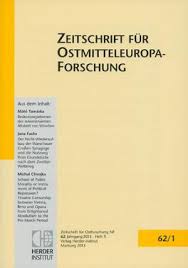Nation, Volk, Minderheit, Volksgruppe: Die deutsche Minderheit in Ungarn in den Begriffskämpfen der Zwischenkriegsära
Nation, "Volk”, Minority, "Volksgruppe”: The German Minority in Hungary and the Struggle over Categories during the Interwar Period
Author(s): John C. SwansonSubject(s): Anthropology, Social history, Sociology of Culture, Interwar Period (1920 - 1939), Inter-Ethnic Relations, Ethnic Minorities Studies
Published by: Verlag Herder-Institut
Keywords: Nation; "Volk”; Minority; "Volksgruppe”; German Minority in Hungary; Struggle; Interwar Period;
Summary/Abstract: The meaning of terms such as “nation,” “Volk.“ “minority,” and “Volksgruppe“ remains vague in many scholarly works, often without a clear understanding of what such categories meant when they were put into practice in the past. The objective of this article is to initiate a new discussion of such categories, by looking at the German speakers of interwar Hungary and how they and others understood their “Germanness” in connection to the categories of nation, Volk, minority, and Volksgruppe. In the interwar period the struggle over meaning of such categories in connection to “German” became acute, as German scholars tried to conceptualize how to talk about Germans outside Germany. Scholars such as Max Hildebert Boehm tried to define the connection between “German” and Volk and between “German” and nation, and Walter Kuhn led a discussion concerning “language islands” - German islands in an ocean of strangers. This scholarship in Germany had an influence on individuals, such as Otto A. Isbert, a German geographer, who wrote about Hungarian Germans. And by the late 1930s many in Germany had begun to see Germans abroad, the German speakers in Hungary, for example, as ethnic brethren, as a German Volksgruppe, not as a minority. The first part of the article focuses on the struggle for meaning in Germany, and then it turns to the understanding of such categories as “nation” and “Volk“ for the German speakers in Hungary themselves. Leaders of Hungary’s German speakers in the postWorld War I era, such as Jakob Bleyer, tried to speak to the Hungarian Germans as members of the German Volk and of the Hungarian nation. Unlike Germans in Germany, Bleyer believed in the need for German speakers to have both a Volk and a nation, much like a person needs a mother and a father. Circumstances changed, however, after Bleyer’s death in 1933. The new leader of the Hungarian Germans, Franz Basch, led the movement in a more völkisch direction, following the lead of Germany, and more and more of the National Socialists. The article points out that so-called Magyars also faced a similar struggle to understand nation, Volk, and minority, and their writings and actions also influenced the German speakers in Hungary, usually by alienating the Hungarian Germans or by granting benefits for assimilation. The last part of the article touches on the meaning of “being German” at the village level, since the overwhelming majority of German speakers in Hungary lived in the countryside. At a time when new ideas were being clarified in Germany, among the Hungarian German leadership, and among Magyars as to what category “Germans” needed to fit into, the rural German speakers lived a pre-modem, locally-defined life, still influenced in the 1930s by healers and superstitions. This discussion of the struggle over categories such as nation, Volk, minority, and Volksgruppe in connection to the German speakers of Hungary during the interwar years highlights the need for clarification whenever such categories are used.
Journal: Zeitschrift für Ostmitteleuropa-Forschung
- Issue Year: 55/2006
- Issue No: 4
- Page Range: 526-547
- Page Count: 22
- Language: German

